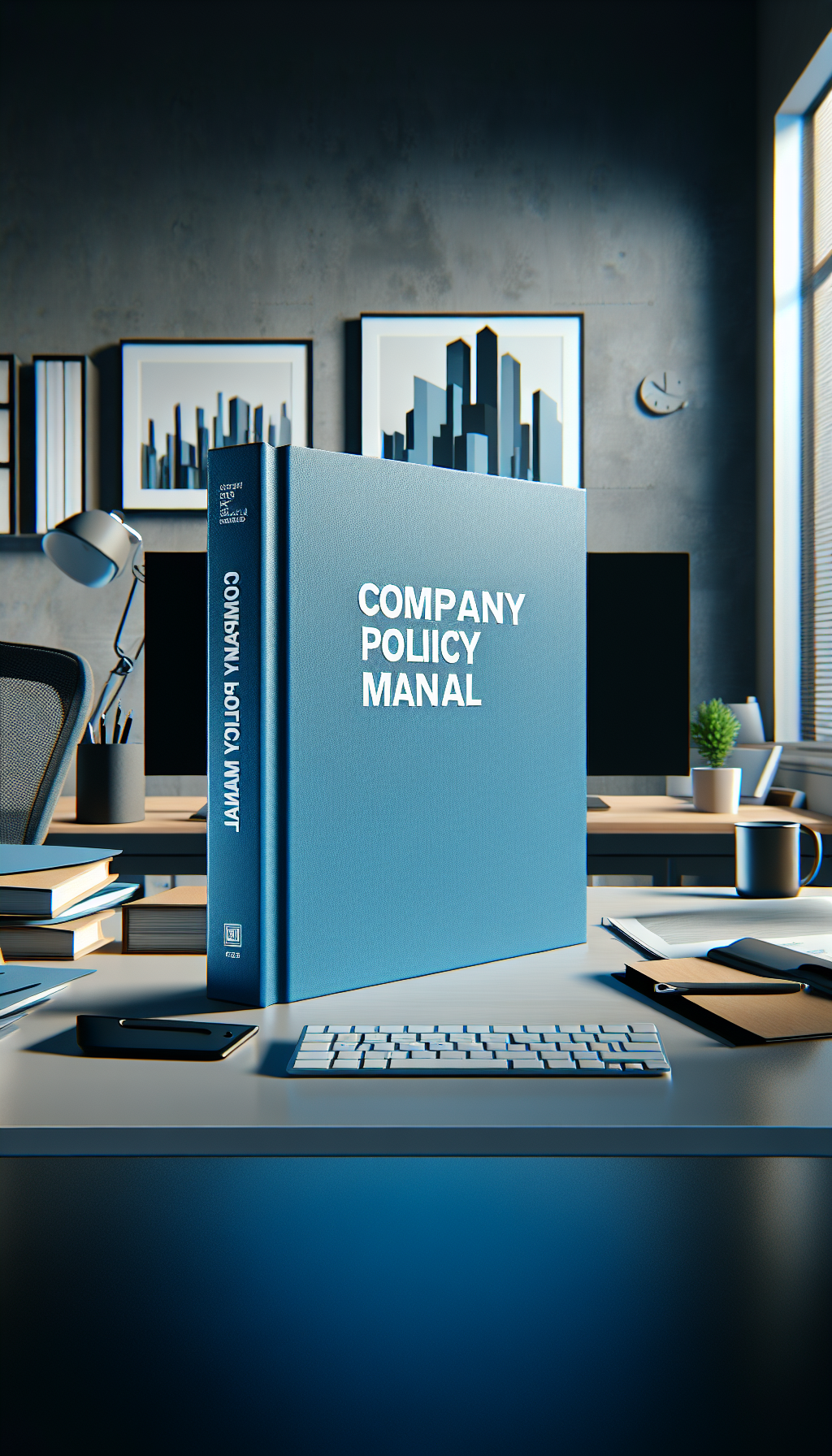The Indispensable Foundation: Why Robust Company Policies
and Procedures are Crucial for Your Success

In the dynamic landscape of modern business, sustainable growth isn't merely about innovative ideas and a dedicated workforce. It's also about establishing a strong, reliable infrastructure. At the heart of this infrastructure lie well-defined company policies and procedures. These aren't just dusty documents relegated to the back of a filing cabinet; they are the bedrock upon which a successful and ethical organization is built. They are the guiding principles that shape your company culture, ensure consistent operations, mitigate risk, and ultimately drive long-term prosperity.
Imagine trying to navigate a complex maze without a map or clear directions. That's precisely what operating a business without comprehensive policies and procedures feels like. In this article, we will delve into the multifaceted importance of having robust company policies and procedures in place. We will explore how they benefit your organization, protect your employees, and contribute to a thriving and sustainable future.
Foundation of Consistency and Clarity with Company
Policies and Procedures:

At their core, company policies and procedures provide a clear and consistent framework for how your organization operates. They set the standards for acceptable behavior, outline expected performance levels, and define the steps involved in various processes, from onboarding new employees to handling customer complaints. This consistency is crucial for several reasons:
Eliminating Ambiguity: Clear policies leave no room for interpretation or guesswork. Employees understand what is expected of them, how to perform their tasks correctly, and what consequences they might face for failing to meet expectations. This reduces confusion and minimizes the potential for errors.
Ensuring Fairness and Equity: Policies ensure that all employees are treated fairly and equitably, regardless of their position, background, or personal characteristics. This fosters a sense of trust and belonging, contributing to a more positive and inclusive work environment.
Maintaining Operational Efficiency: Standardized procedures streamline workflows, improve productivity, and reduce waste. When everyone follows the same steps for a particular task, it minimizes the likelihood of errors and ensures that resources are used efficiently.
Mitigating Risk and Ensuring Compliance:

Beyond creating a more efficient and equitable workplace, robust company policies and procedures are vital for mitigating risk and ensuring compliance with relevant laws and regulations. In today's litigious environment, it's crucial to protect your organization from potential legal liabilities.
Legal Compliance: Policies help you comply with employment laws, health and safety regulations, data privacy laws, and other legal requirements. By clearly outlining your commitment to these standards, you demonstrate due diligence and reduce the risk of fines, lawsuits, and reputational damage.
Risk Management: Policies address potential risks related to workplace safety, data security, financial fraud, and other critical areas. They provide guidelines for preventing these risks and outline the steps to take if an incident occurs.
Protection Against Liability: Well-documented policies provide evidence that you have taken reasonable steps to prevent harm and protect your employees, customers, and the public. In the event of a legal dispute, these policies can serve as a crucial defense.
Building a Strong Company Culture:

Your company policies and procedures are not just about rules and regulations; they also reflect your company's values and shape its culture. By incorporating your core values into your policies, you can create a work environment that is aligned with your mission and vision.
Communicating Values: Policies provide a tangible way to communicate your company's values to employees. For example, a policy on ethical conduct demonstrates your commitment to integrity, while a policy on diversity and inclusion reinforces your commitment to creating a welcoming and equitable workplace.
Promoting Ethical Behavior: Policies can encourage ethical behavior by providing clear guidelines on how to handle conflicts of interest, avoid bribery and corruption, and protect confidential information.
Fostering Employee Engagement: When employees understand the rationale behind policies and feel that they are being treated fairly, they are more likely to be engaged and committed to their work. Transparent and well-communicated policies build trust and create a sense of shared purpose.
Empowering Employees and Promoting Accountability:
Effective company policies and procedures empower employees by providing them with the knowledge and resources they need to succeed. They also promote accountability by clearly defining responsibilities and consequences.
Empowering Employees: Policies provide a framework for employees to make informed decisions and take ownership of their work. When employees understand the rules of the game, they are more confident in their ability to perform their jobs effectively.
Defining Responsibilities: Policies clearly outline the responsibilities of each employee, ensuring that everyone knows what is expected of them. This reduces ambiguity and minimizes the potential for misunderstandings.
Promoting Accountability: Policies establish a system of accountability by defining the consequences of violating company rules or failing to meet performance expectations. This helps to maintain order and ensure that everyone is held responsible for their actions.
Attracting and Retaining Top Talent:

In today's competitive job market, a company's policies and procedures can be a significant factor in attracting and retaining top talent. Employees are increasingly looking for organizations that are well-managed, ethical, and committed to their well-being.
Demonstrating Professionalism: Well-defined policies and procedures demonstrate that your company is professional and well-organized. This can be a major selling point for potential employees.
Attracting Top Talent: Companies with strong policies are often seen as more desirable employers. Candidates are drawn to organizations that prioritize fairness, transparency, and employee development.
Improving Employee Retention: Clear and fair policies contribute to a positive work environment, which can improve employee morale and reduce turnover. Employees are more likely to stay with a company that treats them with respect and provides them with opportunities for growth.
Developing and Implementing Effective Company Policies
and Procedures:
Creating effective company policies and procedures is an ongoing process that requires careful planning, communication, and review.
Identify Key Areas: Start by identifying the key areas where policies are needed, such as employment practices, health and safety, data security, and financial management.
Involve Stakeholders: Involve relevant stakeholders, such as employees, managers, and legal counsel, in the development process. This will ensure that the policies are practical, relevant, and legally sound.
Write Clear and Concise Policies: Write policies that are clear, concise, and easy to understand. Avoid jargon and use plain language.
Communicate Policies Effectively: Communicate the policies to all employees through training sessions, employee handbooks, and online platforms.
Review and Update Policies Regularly: Review and update policies regularly to ensure that they remain relevant and compliant with changing laws and regulations.
Conclusion
In conclusion, company policies and procedures are not merely bureaucratic necessities; they are the foundation upon which a successful, ethical, and sustainable organization is built. They provide clarity, consistency, and accountability, mitigating risk, fostering a positive company culture, and attracting and retaining top talent. By investing in the development and implementation of robust policies and procedures, you are investing in the future of your organization. You are creating a framework for success that will benefit your employees, your customers, and your stakeholders for years to come. You pave the way for a more secure, efficient, and rewarding business journey.